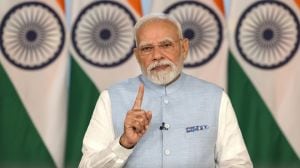How Germany never managed to build the bomb
It was a coincidence and an educative one. As the political fires raged around the India-US nuclear deal...

It was a coincidence and an educative one. As the political fires raged around the India-US nuclear deal, I happened to catch a film called Copenhagen on TV, about a meeting in 1941 between two of the greatest physicists of the 20th century: the Danish Niels Bohr, father of quantum theory, and his protégé, the German Werner Heisenberg, who discovered the Uncertainty Principle, backbone of quantum mechanics. No one knows for sure what the two men spoke about during their post-dinner walk, yet the conversation possibly changed history. All that is known is that they parted angrily. Heisenberg, the original wunderkind (Nobel laureate at the age of 31), went back to Berlin, where he was heading the German nuclear bomb mission, and soon after the meeting, Bohr fled Denmark to join the Manhattan Project, which would create the world’s first nuclear bomb.
I must here clarify that this column has no relevance to the current nuclear deal impasse. I am for India-US nuclear cooperation, but the lives of Bohr and Heisenberg have nothing to do with it.
Copenhagen postulates that during that fateful walk, Heisenberg asked Bohr to join the German effort, which Bohr curtly refused. Heisenberg then tried to explain to Bohr — indirectly — that he had no intention of making the bomb, because he had made a moral decision that the bomb would be Evil. But Bohr misunderstood, and abused the German race, which Heisenberg would not stand. He was a profoundly patriotic German. The two never clarified what actually happened, but this is a plausible explanation. Germany never managed to build the bomb, even though the effort was led by Heisenberg and Otto Hahn, the man who discovered nuclear fission, which is what the bomb is about.
My dear friend Ravi Vyas, who mentioned Copenhagen to me years ago, has been kind enough to send me an article from the New York Review of Books on the “Farm Hall transcripts”. After Germany fell, all top German nuclear scientists were interned for about six months in a country estate called Farm Hall near Cambridge. They were treated graciously, and they never knew that all their conversations were being recorded. The transcripts are now in the public domain. How the Germans reacted to the news of the Hiroshima bombing is fascinating.
The British officer in charge of Farm Hall writes: “Their first reaction… was an expression of horror that we (the Allied forces) should have used this invention for destruction.” Hahn “felt personally responsible for the deaths of hundreds of thousands of people, as it was his original discovery which made the bomb possible. He told me that he had contemplated suicide when he realised the terrible potentialities of the discovery… With the help of considerable alcoholic stimulant, he was calmed down, and we went down to dinner.”
What soon becomes clear from the conversation of the Germans is that Heisenberg and Hahn had focused the German project on developing a nuclear reactor and not a bomb. They were far ahead of the Americans in this. The reactor produces energy, and the bomb kills people. One scientist, von Weizsacker, says: “I believe the reason we didn’t do it (build the bomb) was because all the scientists didn’t want to do it on principle.” Says Heisenberg: “At the bottom of my heart I was really glad that it was to be an engine (reactor) and not a bomb.” Hahn: “I thank God on my bended knees that we did not make a uranium bomb.”
Later, Hahn and Heisenberg were alone in the room. The British eavesdroppers write: “Hahn replied that he… loved his country and that… it was for this reason that he had hoped for her defeat… Heisenberg stated that had they been in the same moral position as the Americans and said to themselves that nothing mattered except that Hitler should win the war, they might have succeeded, whereas they did not want him to win.” Next morning, Weizsacker says: “The peaceful development (of the reactor) was made in Germany… whereas the Americans and English developed this ghastly weapon of war.”
Treason or patriotism? These men put their lives on the line to make sure that Hitler never got the bomb, yet Germany gained from nuclear power. For nearly a decade, they stonewalled their masters, and focused on doing what they thought was right. And they never ever spoke about it publicly in their lifetimes (Heisenberg died in 1976). These men were heroes.
On November 16, 1945, while they were still “guests” at the Farm Hall, Hahn was awarded the Nobel Prize for Physics for his discovery of nuclear fission.
Sandipan Deb, former Editor of The Financial Express, heads the RPG Group’s forthcoming magazine venture.
sandipandeb@yahoo.co.uk
Photos





- 01
- 02
- 03
- 04
- 05

























